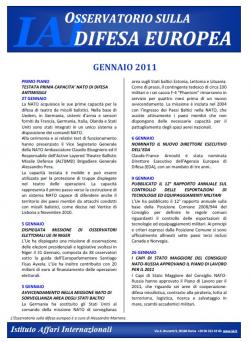Observatory on European defence, April 2004

5-6 April 2004
EU Defence Ministers - Capabilities, Defence Agency, Missions
An informal meeting of EU Defence Ministers was held in view of the coming European Councils (17 May and 17-18 June).
The Ministers discussed several proposals submitted by the Council Secretariat:
- adoption of new capability goals for the 2004-2010 period (so-called 2010 Headline Goal): qualitative targets to increase the availability of national forces to the European Union; these forces are not standing or permanently assigned to the EU. Strategic transport is one of the most required assets.
- in the framework of the 2010 Headline Goal, establishment of some Battle groups by 2007 (a limited number by 2005), response elements (about 1,500 units) provided by one or more member states for rapid reaction operations led by the European Union and capable of the most demanding Petersberg-type operations.
- establishment of the non-permanent EU planning headquarters, to strengthen the national headquarters in management of operations led by the European Union without activating the Berlin Plus permanent arrangements with NATO.
- adoption by the Council of the decisions needed to establish the Defence Agency by the end of the year.
- the EU takeover of the NATO SFOR military mission in Bosnia.
- strengthening relations between NATO and EU, as well as between UN and EU.
The EU Military Committee - chaired for the first time by Italian General Rolando Mosca Moschini - dealt with these issues on 7 April.
26-27 April 2004
GAERC - Missions, Middle East
The General Affairs and External Relations Council (GAERC) approved the general concept of the EU-led mission in Bosnia, taking over from the NATO SFOR operation, submitted by the HR for CFSP and already discussed by the PSC.
The approved document determines the aims of the operation and the chain of command based on the Berlin Plus permanent arrangements with NATO. The launch of the mission in the second half of 2004 now depends on a NATO decision to end the SFOR operation, likely to be taken at the Istanbul Summit on 28-29 June.
The Council adopted a statement on the Middle East in line with the outcome of the informal meeting held on 16-17 April (see above).
Moreover, the Council discussed - without reaching an agreement - the embargo on arms supplies in force against China that some member states (specifically France) have proposed to end.
April 2004
Europe - Middle East
The attention of the international community is focused on the stalemate in the Middle East, not only for the long-term proposals under discussion at NATO and at European level.
The US Administration - during a bilateral summit at the highest levels between the US and Israel held on 14 April - endorsed Israeli Prime Minister Sharon’s plan, which foresees the unconditional withdrawal of the occupation forces from the Gaza area, keeping other settlements in the West Bank.
On 15 April, the HR Solana reacted negatively to the Israeli decision, underlining the need for negotiations between the parties, supported by the involvement of all the Quartet members (UN, USA, EU and Russia).
On 16-17 April, the EU Defence Ministers informal “Gymnich” meeting issued a Presidency statement that supports the HR’s position in favour of a unilateral Israeli withdrawal from Gaza, as long as it is pursued in the framework of a comprehensive agreement, ensuing from negotiations between the parties.
The EU position was confirmed during the meetings held in Washington between Solana and the US Government on 20-21 April.
On 26-27 April, the GAERC adopted a document on the peace process in the Middle East that confirms the principle of an arrangement between the parties based on the relevant UN resolutions.
The Quartet will meet on 4 May to find a common position to revive the “Road Map” peace process.
Policy towards the Middle East will be discussed at the NATO Summit in Istanbul on 28-29 June (so-called “Greater Middle East” initiative).
April 2004
Europe - Iraq
During the last month there have been fresh outbreaks of fighting between the US-led coalition and opponents coming from different ethnic and religious groups that use guerrilla as well as terrorist tactics.
The European governments expressed their concern for the escalation that seems to be preventing a broader NATO involvement in the crisis.
In this context, on 18 April came the Spanish decision to withdraw its contingent (about 1,300 men) while expressing strong criticism of the present US policy.
During the Gymnich meeting on 16-17 April, the EU Defence Ministers discussed the situation and urged the adoption of a new UN resolution supporting and establishing an institutional context for the transfer of authority from the coalition to local representatives.
The situation will probably get worse in view of the first handing-over of powers to a newly established local government, expected for 30 June.
Moreover, on 28 April the first photographs picturing torture and crimes carried out by the occupying coalition forces against Iraqi prisoners and civilians came out in the American and British media, further complicating a situation already hard to manage.
-
Details
Roma, Istituto affari internazionali, 2004 -
Issue
04/04


